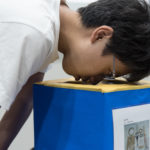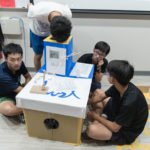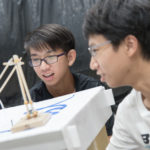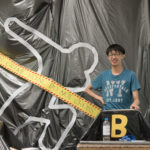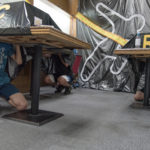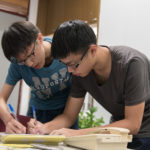決賽自然進階關卡「牽起你的小手手」,除了含有頗具難度的實作部分外,還有充滿挑戰性的生物知識考驗,關卡故事背景描述壞掉的地獄列車需要小鐵人們互相牽起對方的小手手,在伸手不見五指的地獄裡製作出機械手臂,再運用機械手臂搬運多多燃料罐,幫忙修復列車。
“Holding Your Dexterous Hand,” the third sciences advanced task of the 16th Intelligent Ironman Creativity Contest, includes not only the difficult operation stage and also the challenging test about biology. The background of the task is that the hell-bound train is broken and it needs to be recovery by the contestants. The contestants need to hold others’ hands and make a robotic arm in “hell filled with darkness,” and then, to use that robotic arm to move Yakult bottles used as fuels to recover the train.
闖關流程為利用提供的特殊木材、膠帶、棉線以及竹筷等材料在看不見箱內的條件下,於道具箱裡製作出機械手臂,並取得材料箱的養樂多罐,最後拼出人體圖的肌肉名稱。
The contestants can use the materials including a wooden base, a roll of tape, cotton strings, disposable chopsticks, etc., to make a robotic arm in the construction box in which you can see nothing, and then use it to get Yakult bottles. Lastly, they need to spell out the muscle names of the human anatomy pictures.
關主李珮慈指出,關卡的設計理念來自於大學一門關於觸覺感知的課程,了解到在看不到的情況下做事將更加困難,加上負責智鐵關卡的老師也建議可以把機械手臂納入關卡中,於是就決定將兩者作結合。
The taskmaster, PEI-CI LEE, indicates that the design concept of the task is derived from a course about sense of touch in her college. That course made her realize that doing things without seeing is more difficult. Also, the director of IICC suggests that they can use the concept of a robotic arm into the task, so finally they combine all ideas to complete the design of the task.
關主林叡均表示,這關主要是考驗小鐵人們的實作能力以及領導統整能力,實作部分較具難度的部分在於要在看不見的狀況下製作道具,箱子上僅有一個小天窗,可指派一名隊員透過天窗引導其他隊員進行操作,十分考驗小鐵人們的團隊合作及實作的能力。
The taskmaster, RUI-JUN LIN, says that the task tests the ability of operation and integration. The more difficult part of the operation stage lies in making objects without seeing. But there is a small window on top of the box, and one of team members can guide others to make a mechanical arm. This task definitely tests teams’ cooperation skills and operation abilities.
鏡頭切換到這間播放著陰森音樂的房間,隊員輪流拿線索到檔案庫調查和推理,在過程中不能互相交談,這是決賽藝文類進階關卡「模犯生」,小鐵人們必須化身成為模犯生。故事背景講述美國發生了一起謀殺案,在警方的調查下仍疑雲重重,需要小鐵人們協助調查這起謀殺案。
The team members take turns taking the clues to the archive area for investigation and reasoning, and they can’t talk to each other in the process. This is the literature & arts advanced task of the 16th IICC “Bad Genius.” In the process, the contestants seem to turn into bad geniuses.
The background of the story is that there is a murder case in the United States, under the police’s investigation, there is still lots of suspicion remaining. So, the contestants need to help investigate this murder case together.
關卡流程為扮演模犯生的小鐵人們要在時間有限且不能交談的情況下,輪流進入檔案庫中,在檔案庫閱讀且牢記線索後回到指揮部,最終得出桌上問答紙的答案,破解案件。
The contestants acting as bad geniuses have to take turns going into the archive area, read the information and remember the clues within a limited time, and they can’t talk to each other while breaking through the task. And then, they need to go back to the headquarters and answer on the question sheet to break the case finally.
關主莊孝穎表示,關卡的設計靈感來自於泰國電影「模犯生」。他說明,平常大家都認為作弊是錯誤的,但若他們反過來要求小鐵人們作弊,並利用各種比手畫腳等常見的作弊方式來溝通,這種闖關形式應該會很有趣。
The taskmaster, XIAO-YING ZHUANG, explained that the design inspiration of the task is from the Thailand film “Bad Genius.” He says, usually everyone thinks that cheating is wrong, so they think if they ask the contestants to cheat in turn and to use “charade” to communicate with each other, the task would be very interesting.
莊孝穎更指出,這關主要測驗小鐵人們英文、記憶及邏輯推理的能力,線索裡也包含了有關資訊、地理、歷史、藝術的題目。關卡中困難的地方在於,要在不能講話的情況下溝通,且還要記下所得到的大量資訊並藉之加以推理。
XIAO-YING ZHUANG also mentioned that this task mainly tests the ability of English, memory and logical reasoning. The clues also contain the topics related to information, geography, history and art. The difficulty in the task is that team members have to communicate without speaking and remember a good deal of information for reasoning.
自然及藝文的進階關卡皆有一定的難度性,考驗著小鐵人們多方面的能力。期盼他們齊力發揮團隊合作的精神,為高中生涯增添一段關於智鐵的美好回憶。(記者吳思妮、盧又鉦/採訪報導)
The sciences and literature & arts advanced tasks are more difficult, and they test the ability of the contestants in many aspects. Expect them to make the most of their team spirit and make it a fond memory in high school. (Reported by SI-NI WU and YU-CHENG LU)

